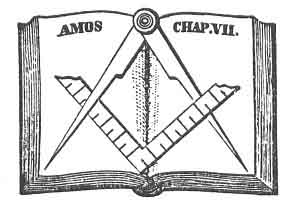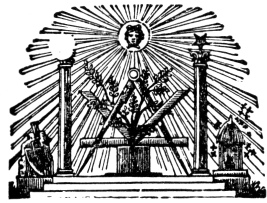It is, however, to be observed, that should a Minerval, or any other of the Brethren, make a discovery in any art or lucrative science, he is obliged, under pain of being looked upon as a false Brother, to impart the secret to the Order, who will look upon itself as proprietor of such secrets should they have been discovered by a Brother after his admission among them. 13
Lest he should be unobserved when travelling, the Minerval is never to undertake any journey without previously informing his superiors, who will send him letters of recommendation for different Brethren on the road. He, in return, must carefully report every thing that he shall discover during his travels, which may be to the advantage or disadvantage of the Order. 14
But we must not forget to mention, that during the academic sittings, the presiding Illuminee is at least once a month to take a review of the principal faults which he may have observed in any of his pupils. He is to interrogate them concerning those which they may have observed themselves; “and it would be unpardonable neglect,” says the statutes, “should any pupil pretend that during the space of a whole month he had remarked nothing reprehensible. This would be a proof of the utmost negligence in the training of his mind to observation; and the Superior must not suffer it to pass without reprehension. He must also make his observations in such a manner as to excite their serious attention, and effectually to impress them with proper notions, so that each on returning home shall be ready to put in practice his advice for the advantage of the Order. 15 Beside, the Superior is as much as possible to avoid letting a day pass without seeing his pupils, either he visiting them, or they him. 16
But what can be the object of such vigilance, such unremitting attention to the Minerval Academy? A single word from the adept who, under the inspection of Weishaupt, organized its laws, will explain the enigma. It is, to adopt Knigge’s expressions, by the works required of the young Academicians that the Order will be able to judge whether they are of that sort of stuff (that is to say of that turn of mind, susceptible of all the principles of Impiety and Anarchy) which is necessary for the higher degrees. After all these labours, should the Minerval adept still retain any of what they call religionist inclinations, he will then receive the three first Masonic degrees, and in them he may moulder during the rest of his life in the insignificant study of all their hieroglyphics. He will indeed still continue under the inspection of the Superiors of the Order; but he may rest assured, that he will always remain a Minerval, with a brevet of imbecility, on the registers of the Sect. 17 On the contrary, should he have shown a sufficient want of attachment to religion or to his Prince; should he enthusiastically imbibe the principles of Illuminism, he will certainly be promoted to higher degrees. During his academical course the
p. 444
[paragraph continues] Sect has had unerring means of judging him; viz. by the questions he has solved (and which were put by the Order, not so much with a view of exercising his talents as of prying into his opinions), and by the statements delivered in by the Scrutators, of the impression made by the different principles which they had disseminated either in the shape of conversation, or by way of refutation, to try the young Minerval.
The questions which he has had to investigate during his course sometimes regarded the secret of the Sect; at others, the security of the adepts, and of the Superiors. To envelop the chiefs in impenetrable darkness, and that their asylum may be proof against all attempts, death itself is to be divested of its horrors. The Minerval must not finish his Academical course till he has shown how far such fears have lost their influence over him; he shall declare whether he is ready to submit to every torture, rather than give the least information concerning the Order; or even evade the temptation by poison or suicide. A dissertation upon Cato, for example, will be given him as a task, and his management of it will show whether he is ready to fall by his own hand for the preservation of the Brethren. The patet exitus, or the exit is free, that is to say, that every man is free to leave this life at his pleasure, is one of those grand principles which must be advanced; it must be commented on and discussed by the young adept; and should any of those puerile ideas appear, which lead to believe in a God the avenger of suicide, he is not the man to be entrusted with the secret, and he shall be rejected. 18

Moe is the founder of GnosticWarrior.com. He is a father, husband, author, martial arts black belt, and an expert in Gnosticism, the occult, and esotericism.




